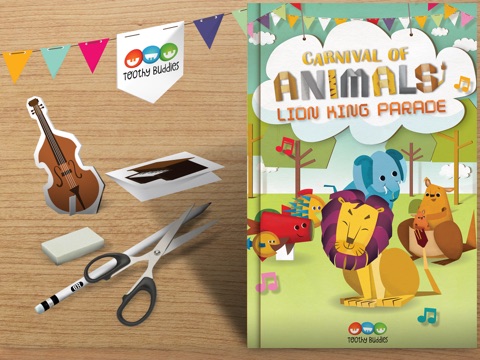
Lion King Parade: Music Education for Your Kids app for iPhone and iPad
With its strong and solid steps, the well-respected lion king shows the way for children to step into the magical parade The Carnival of the Animals held by Saint–Saëns. From waking up the cub’s father, to going on parade with the lion king, and to learning the roars, children learn not only a range of basic music elements from these stories, but also the characteristics of this mammal.
The critical period for brain development starts from the age of two to six, since children are receptive to instructions and are ready to coordinate their muscles. So, that is the best time for parents to shower their children with music delights! One of the wonderful delights would be classical music composed with.
The children-friendly and animal-based stories from our app series “Carnival of Animals” introduce children to enjoy the renowned classic piece The Carnival of the Animals by French composer Saint–Saëns. In order to make conceptual and abstract music knowledge an easier grasp for children, professionals who are specialized in teaching toddler’s music produce a set of graphic scores—a set of simplified scores complemented with lovely illustrations. Comprehending sheet music is therefore now made an interesting practice: immersing themselves in the music, children tap and pull the images to the rhythm and pitch. The interactive element allows them to know if they make any mistakes in catching up with various music components and make improvements afterwards.
What will children learn from Lion King Parade?
In Lion King Parade, an intense atmosphere is built up by the rhythm of the first-half of the piece, followed by a stable beat which depicts how composed and swagger the lion is when it goes on parade. Moreover, the running scales in two pianos, where fingers run rapidly up and down the keyboard, vividly represent the lion’s roar with the use of melody. In fact, children will learn unique music elements embedded in each and every short piece in The Carnival of the Animals. For example, they will learn how to:
• Master the rhythm: Rhythmic foundation holds the key to learning and playing music, and even singing. Only if children develop a strong sense of rhythm can they hum the piece’s rhythm while learning, and embrace the learning of different music pieces—regardless of how complex or inconstant the rhythm may be.
• Tell the tempo: As the speed of the music piece changes, the originally steady rhythm also conforms accordingly. The practices in the stories are only completed if children can determine the tempo in the music piece, as if they are the traditional Chinese medicine doctor who checks on the pulse of the music, whether it is fast or short-paced.
• Spot out the melody: By pulling up and down along the graphic notation according to the ascending and descending chromatic scale, children have a basic idea of pitch and gain a sense of melodic scale.
We are on:
•The Guardian: “50 best Android apps for kids 2013”
•Red Rocket: “2013 Best Educational Android Apps”
•Joy of Android: “ Top 10 Android Apps for Kids Learning”
•Memory Pointer.com: “10 Best Android Apps For Kids From 2013”
•Famigo “Famigo APProved Badge” awarded
•Fun Educational Apps: “ Top Educational Apps”
•The iPhone Mom 5 Star recommendation
•The iMums
•Smart Apps for Kids
•Top Kids Apps



